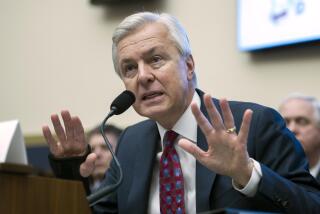Hutton Pays Fines Totaling $1.01 Million
- Share via
PROVIDENCE, R.I. — E. F. Hutton & Co. paid $1.01 million in fines on Monday for a money-laundering scheme in which $1.5 million in cash was hidden from the government for clients, some of them members of organized crime.
Hutton attorney E. Lawrence Barcella Jr. signed a guilty plea to three felony counts and turned a check for the fine over to U.S. Attorney Lincoln C. Almond.
The brokerage company was fined $10,000 for conspiracy to violate the Bank Secrecy Act and $500,000 for each of two counts of violating federal cash transaction reporting laws. The fines were the maximum allowed under the law.
Criminal charges filed May 6 in U.S. District Court accused Hutton of failing to report at least $532,000 in currency transactions at the Providence office.
On Monday, however, authorities said that as part of the scheme, two former Hutton brokers helped clients hide about $1.5 million from the Internal Revenue Service.
Secretaries Bought Bonds
Cash transactions of $10,000 or more must be reported to the IRS.
Authorities said briefcases stuffed with cash were brought into Hutton’s Providence office. In an activity known as “smurfing,” secretaries carrying envelopes full of money were then dispatched to different area banks the same day to buy bearer bonds or certificates of deposit for less than $10,000.
Fictitious Names
Authorities said the scheme came to light when a bank employee noticed that a Hutton secretary purchased two bonds for just under $10,000 the same day.
The transactions were made under fictitious names for legitimate businessmen and members of organized crime, according to Almond and Jeremiah T. O’Sullivan, head of the Justice Department’s New England Organized Crime Strike Force.
Stephen Fusco, a Hutton broker who died of cancer about two years ago, handled the accounts that authorities have linked to organized crime.
The address for one client was the same North Providence apartment where Raymond L. S. Patriarca, longtime boss of the New England mob, was found dead of a heart attack in July, 1984, while another account was linked to a convicted mob pornographer who used it to buy an adult book store in Boston.
The money laundering, which authorities say began in May, 1982, stopped one month after Patriarca’s death.
Cash Deposits Prohibited
Fusco and the other former Hutton broker were also named in the criminal information documents filed in court. Brian J. Lareau, 46, of Jamestown, was scheduled to be arraigned today on charges of money laundering and false representation of a Social Security account number.
O’Sullivan and Almond said Lareau had no ties to organized crime, and that he and Fusco were not partners in their alleged illegal activities.
Hutton was acquired last year by Shearson Lehman Bros., and the company is now known as Shearson Lehman Hutton. After the merger, all the firm’s branches adopted the Shearson policy of prohibiting cash deposits in any amount, Shearson spokesman Michael O’Neill said.
As part of the plea agreement, the government stated “no one above the Providence branch office level of the company was involved and that the money laundering occurred prior to the acquisition of the defendant by the Shearson Lehman Co.”
“None of the people who were involved in any of the transactions are with the company anymore,” O’Neill said. “We don’t see it as having any impact on the company.”
Under federal Securities and Exchange Commission rules, the company’s felony conviction could cause a suspension of its investment services.
O’Neill, however, said the company should be able to obtain exemptions from any federal sanctions it could face. Glen A. Payne, assistant director of the SEC’s investment management division, said Shearson filed for a temporary exemption to the sanctions Monday.
Sometime in the next eight months, the commission will make a decision on the firm’s request for permanent protection based on an outside audit of Shearson and its efforts to set up procedures to follow the cash transaction reporting laws, Payne said.
Last October, the SEC censured Hutton for violating provisions of the SEC law and rules relating to financial record-keeping and reporting of currency transactions.
More to Read
Sign up for Essential California
The most important California stories and recommendations in your inbox every morning.
You may occasionally receive promotional content from the Los Angeles Times.










